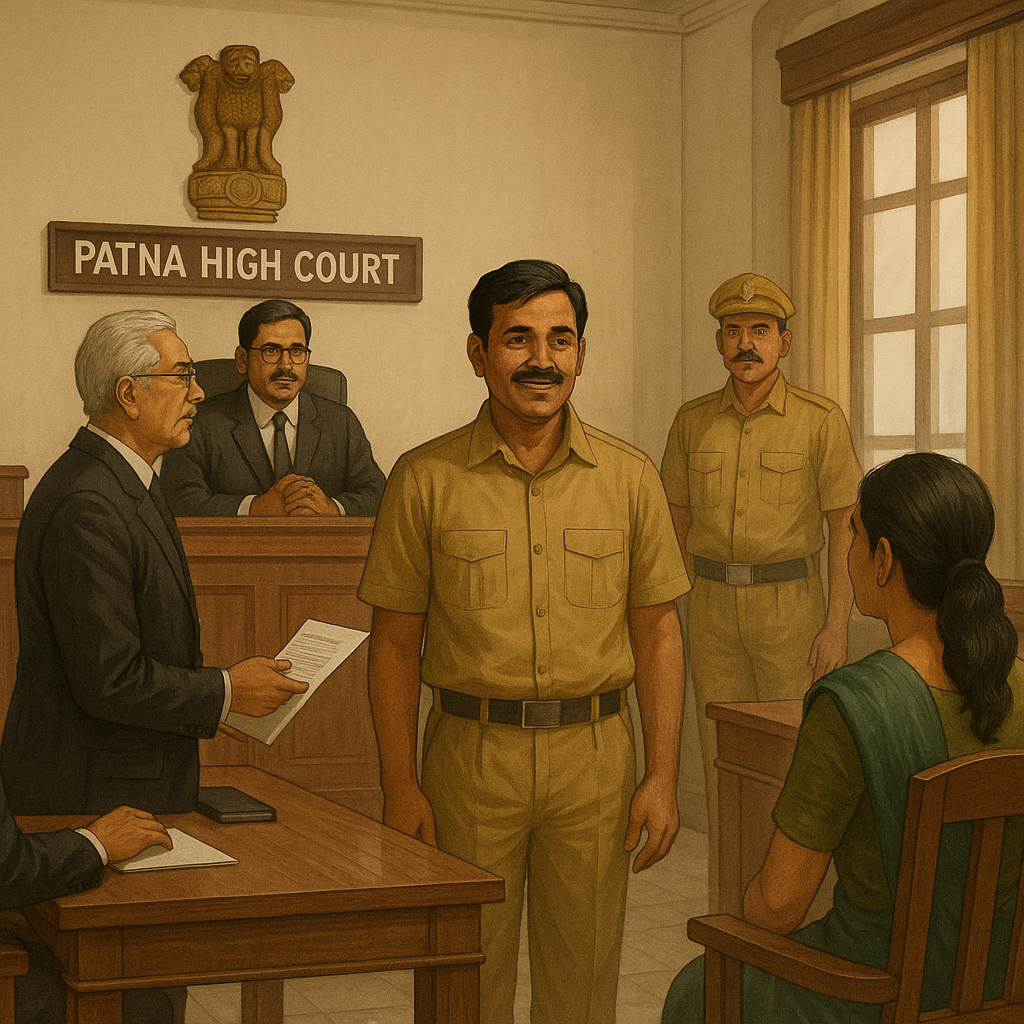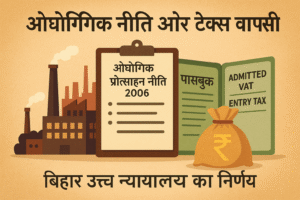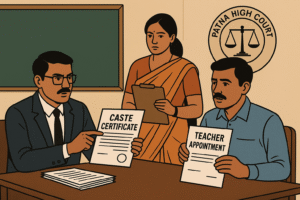Simplified Explanation of the Judgment
In a significant ruling, the Patna High Court has reinstated a Nazir (court officer) from Bhagalpur Civil Court who had been dismissed from service on allegations of negligence and bribery during execution of a court decree. The judgment, delivered by Hon’ble Mr. Justice Mohit Kumar Shah on 13 August 2020, quashed the disciplinary and appellate orders, terming them as based on “no evidence,” and directed full back wages with continuity of service.
Background
The petitioner, then working as Nazir Incharge, Civil Court, Bhagalpur, was responsible for executing a court’s order to hand over possession of a shop to a decree-holder in a Title Execution Case No. 17/1999. On 14 December 2003, the Nazir attempted the delivery but could not proceed due to the absence of police personnel, though an Executive Magistrate was present. He submitted a report explaining that the possession could not be delivered for want of police assistance.
Despite this, the District Judge initiated departmental proceedings against him, alleging that:
- He negligently failed to arrange police force, thus defeating the court’s writ.
- His peons demanded ₹20,000 as bribe at his instance.
An enquiry officer was appointed to investigate.
Enquiry Findings and Punishment
The Enquiry Officer exonerated the Nazir from the bribery charge, finding no evidence that he or his subordinates took or demanded money. However, the officer held him guilty of “gross negligence” for proceeding without police assistance, suggesting a lesser penalty instead of dismissal. The District Judge disagreed and imposed the harshest punishment — dismissal from service (11 July 2005).
The petitioner’s appeal before the High Court administration was dismissed summarily on 7 August 2006, without detailed reasoning.
Petitioner’s Defence
Through senior counsel, the petitioner argued that:
- He had made a written requisition on 9 December 2003 to the Superintendent of Police and Sub-Divisional Officer for police deployment and an Executive Magistrate.
- The Sub-Divisional Officer’s order dated 13 December 2003 deputed both, and the copy was sent to the police.
- The Munsif-II Court’s order (20 December 2003) accepted his report as bona fide.
- The decree holder was unavailable on 14 December due to illness, as his daughter (prosecution witness) herself confirmed.
Thus, the petitioner maintained that he neither acted negligently nor defeated the execution process.
Respondents’ Argument
The High Court Administration argued that the Nazir had failed to ensure police presence or proper intimation to the decree holder, reflecting intent to frustrate the order. They also defended the departmental enquiry, asserting that it followed due process and the High Court should not reappreciate evidence.
Court’s Analysis
Justice Mohit Kumar Shah carefully reviewed the departmental record and Supreme Court precedents governing judicial review of disciplinary findings — including B.C. Chaturvedi v. Union of India (1995) 6 SCC 749, Bank of India v. Degala Suryanarayana (1999) 5 SCC 762, Union of India v. P. Gunasekaran (2015) 2 SCC 610, and M.V. Bijlani v. Union of India (2006) 5 SCC 88.
The Court reiterated that judicial review is limited: interference is justified only if findings are perverse or based on no evidence.
Upon examining the enquiry report, the Court found:
- The enquiry officer himself had disbelieved the complainant (Preeti Shree) on the bribery charge.
- No evidence supported the negligence charge — documents proved that requisitions for police and magistrate were duly made.
- Even the respondents’ affidavit admitted the Nazir had sent the necessary letters on 9 December 2003.
- Thus, the finding of negligence was “perverse and unsustainable.”
Final Decision
The High Court held that the entire disciplinary action stood vitiated as the findings were unsupported by evidence. Accordingly:
- The enquiry report (22 March 2005) was quashed.
- The dismissal order (11 July 2005) and the appellate order (7 August 2006) were set aside.
- The petitioner’s termination was declared wrongful.
Relief Granted
Citing Deepali Gundu Surwase v. Kranti Junior Adhyapak Mahavidyalaya (2013) 10 SCC 324, the Court ruled that in cases of wrongful termination, reinstatement with continuity of service and full back wages is the norm, especially where the employer is at fault.
The Bench directed:
- Full back wages from the date of suspension (23 September 2004) till the date of superannuation.
- All consequential service benefits to be released within two months.
Significance or Implication of the Judgment
- Reinforces fairness in disciplinary proceedings: The Court emphasized that punishment cannot stand on speculative or unsupported conclusions.
- Sets a standard for “no evidence” cases: Even if departmental proceedings follow procedure, their conclusions must rest on tangible proof.
- Protects lower court staff from victimization: The ruling recognizes that honest mistakes or administrative failures—like absence of police deployment—cannot justify career-ending penalties.
- Clarifies entitlement to full back wages: Once wrongful dismissal is proved, the employee must be fully compensated unless the employer proves alternate gainful employment.
For government offices, this judgment highlights the need for reasoned appellate orders and adherence to documentary evidence before inflicting severe punishments.
Legal Issue(s) Decided and Court’s Reasoning
- Was the finding of negligence supported by evidence?
❌ No. The Court found that requisitions for police and magistrate were duly made and recorded, hence there was no negligence. - Was the disciplinary authority justified in imposing dismissal?
❌ No. The decision was based on assumptions, not evidence. - Can the High Court reappreciate evidence in disciplinary cases?
✅ Generally no, but it can intervene when findings are perverse or unsupported. - Is reinstatement with full back wages justified?
✅ Yes. Following Deepali Gundu Surwase and other precedents, the petitioner was wrongly dismissed and entitled to full benefits.
Judgments Referred by Parties
- B.C. Chaturvedi v. Union of India, (1995) 6 SCC 749
- Bank of India v. Degala Suryanarayana, (1999) 5 SCC 762
- Union of India v. H.C. Goel, AIR 1964 SC 364
- Lalit Popli v. Canara Bank, (2003) 3 SCC 583
- M.V. Bijlani v. Union of India, (2006) 5 SCC 88
- Union of India v. P. Gunasekaran, (2015) 2 SCC 610
- Deepali Gundu Surwase v. Kranti Junior Adhyapak Mahavidyalaya, (2013) 10 SCC 324
Judgments Relied Upon by Court
The High Court primarily relied on Union of India v. P. Gunasekaran (2015) and B.C. Chaturvedi v. Union of India (1995) to outline the scope of judicial review, and Deepali Gundu Surwase (2013) for granting full back wages.
Case Title
Ajit Kumar Mishra v. The Registrar (Administration), Patna High Court & Ors.
Case Number
Civil Writ Jurisdiction Case No. 13158 of 2006
Citation(s)
2021(3) PLJR 51
Coram and Names of Judges
Hon’ble Mr. Justice Mohit Kumar Shah
Names of Advocates and Appearance
- For Petitioner: Mr. J.S. Arora (Sr. Advocate), Mr. Manoj Kumar, Mr. Mukund Jee
- For the High Court Administration: Mr. Piyush Lall
Link to Judgment
MTUjMTMxNTgjMjAwNiMxI04=-Q1rOiognI7I=
If you found this explanation helpful and wish to stay informed about how legal developments may affect your rights in Bihar, you may consider following Samvida Law Associates for more updates.








